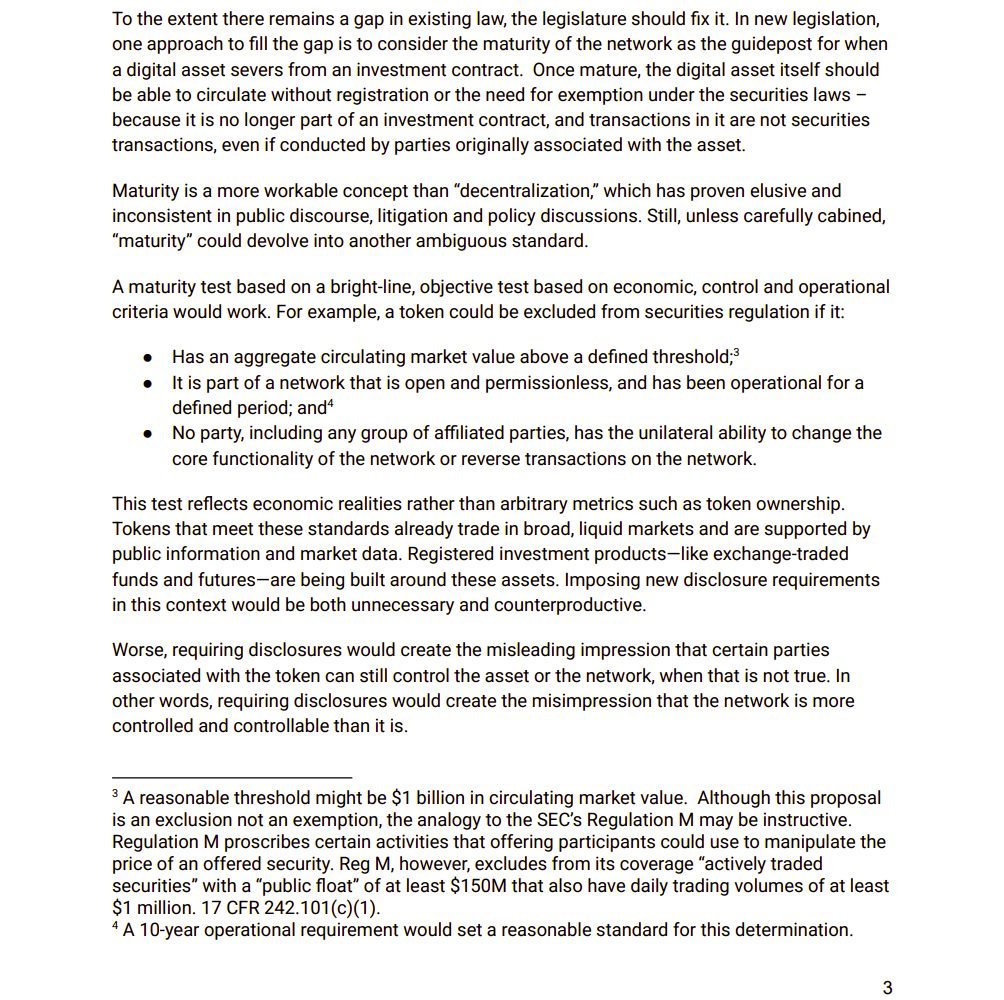Key Takeaways
- Ripple Labs proposed a ‘maturity take a look at’ to find out when crypto tokens ought to not be thought of securities.
- Standards embrace a $1 billion market worth threshold, 10-year operational community, and an open, permissionless construction.
Share this text
Ripple has proposed a brand new legislative framework to find out when crypto tokens ought to not be thought of securities.
The corporate calls it a “community maturity” take a look at, which might consider whether or not a token has outgrown its preliminary funding contract based mostly on goal standards similar to market capitalization, operational historical past, and decentralization of management.
The proposal was outlined in a Could 27 letter from Ripple’s authorized workforce to the SEC’s Crypto Activity Power, responding to the company’s query about when a crypto asset, initially a part of an funding contract, turns into legally distinct from that contract.
“In new laws, one method to fill the hole is to think about the maturity of the community because the guidepost for when a digital asset severs from an funding contract,” Ripple’s authorized workforce famous.
“As soon as mature, the digital asset itself ought to be capable to flow into with out registration or the necessity for exemption underneath the securities legal guidelines – as a result of it’s not a part of an funding contract, and transactions in it should not securities transactions, even when carried out by events initially related to the asset,” they added.
At present, there is no such thing as a bright-line rule underneath federal regulation for when a crypto token transitions from being a part of a securities providing to being a freely tradable commodity or forex.
The SEC has traditionally floated ideas like “ample decentralization” to explain when a token would possibly not be a safety.
Nonetheless, in line with Ripple, that is too obscure and subjective. The workforce has proposed the “community maturity” take a look at as a clearer, extra sensible various to “decentralization.”
Below this method, tokens could possibly be excluded from securities regulation in the event that they meet particular standards, similar to a excessive market capitalization, a long-operating, permissionless community, and the absence of any get together with unilateral management over the protocol.
Ripple mentioned that tokens assembly these requirements already commerce in broad, liquid markets with ample public data and market information. The corporate urged a $1 billion circulating market worth threshold and a 10-year operational requirement as affordable benchmarks.

Token separation and secure harbor proposals
Along with its legislative advice, Ripple has put ahead a authorized take a look at to make clear when a crypto token offered as a part of an funding contract ought to not be handled as one.
Below this framework, a token is presumed to have separated until the issuer has left a cloth promise unfulfilled and the present holder has enforceable rights tied to that promise.
The take a look at is designed to scale back ambiguity and stop indefinite regulatory burdens on secondary market contributors. It preserves the SEC’s enforcement authority in instances involving unfulfilled guarantees or bad-faith resale and permits for brand new funding contracts to be fashioned by downstream actors if warranted.
Whereas acknowledging the SEC’s issues about enforcement gaps, Ripple maintains that solely Congress has the authority to ascertain new authorized requirements for crypto property.
Within the meantime, Ripple urges the SEC to interpret present regulation faithfully and chorus from increasing its regulatory attain past clearly outlined authorized boundaries. The workforce additionally helps the creation of a slender, well-designed secure harbor to guard good-faith actors throughout early community growth.
The letter follows an August courtroom ruling in SEC v. Ripple Labs, during which Choose Analisa Torres held that XRP is just not a safety when traded on secondary markets.
The courtroom, nevertheless, distinguished these transactions from Ripple’s earlier direct gross sales to institutional traders, which have been deemed unregistered securities choices.
Ripple hasn’t absolutely closed the guide on its authorized battle. Earlier this month, Choose Torres refused to approve the corporate’s proposed $125 million penalty cope with the SEC, maintaining the case unresolved.
Share this text















